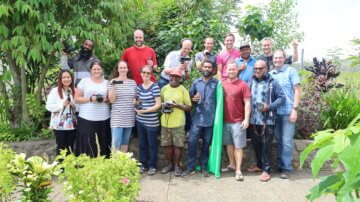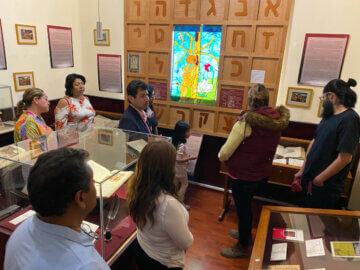Privacy statement
Collecting and Using Personal Information
Welcome to Wycliffe.net. We appreciate your interest in us. This site is "owned" by a number of organizations, but the Wycliffe Global Alliance has the legal responsibility for the site.
When you browse this site or contact us via this site, we will not collect personal information about you unless you provide that information voluntarily. If you supply your postal or email address, you will receive only the information for which you provided the address.
Where required, personal information may be forwarded to the site's partner organizations in order to provide a response to your request or comments.
If you provide non-public personal information (such as a name, address, email address or telephone number) via this site, Wycliffe Global Alliance will only use such information for the purpose stated on the page where it is collected.
Wycliffe Global Alliance does not send unsolicited or "spam" email and does not sell, rent, or trade its email lists to third parties.
In all cases, we will disclose information consistent with applicable laws and regulations if required.
Your Email
We welcome your comments or questions about this website and have provided email boxes for that purpose.
Please remember that all email has the possibility of being intercepted by other Internet users, without your knowledge and permission. For that reason, to protect your privacy, please do not use email to communicate information to us that you consider confidential.
Ownership and Use of Information on the Site
Articles and data on this site may be downloaded or copied free of charge and reused or distributed as required, providing it is done so in a manner that does not disparage or discredit Wycliffe or any of the other partner organizations on this site. It is generally best to quote the source for any article, data or information when taking it from a website.
Please do not download and use the Wycliffe Global Alliance logo, or those of other partners, without permission.
Articles or information provided on our site where Wycliffe Global Alliance is not the original provider should be recognized as belonging to other partners or sources. Please contact the original owners/providers if you wish to use the articles or information that do not belong to Wycliffe.
Although Wycliffe Global Alliance attempts to ensure the integrity and accurateness of the site, we cannot guarantee accuracy of the site. It is possible that the site could include typographical errors, inaccuracies, or other errors and that unauthorized additions, deletions, and alterations could be made to the site by third parties. In the event that an inaccuracy occurs, please inform us so that it can be corrected.
Other Information: e.g. "Cookies" and "log files"
You should also be aware that when you visit our website, we collect certain information that does not identify you personally, but provides us with "usage data," such as the number of visitors we receive or what pages are visited most often. This data helps us to analyze and improve the usefulness of the information we provide at these websites.
Like most website owners, we may use what is known as "cookie" technology. A "cookie" is an element of data that a website can send to your browser when you connect to that website. It is not a computer program and has no ability to read data residing on your computer or instruct it to perform any step or function. By assigning a unique data element to each visitor, the website is able to recognize repeat users, track usage patterns and better serve you when you return to that site. The cookie does not extract other personal information about you, such as your name or address.
There are two main kinds of cookies: session cookies and persistent cookies. Session cookies are deleted from your computer when you close your browser, whereas persistent cookies remain stored on your computer until deleted, or until they reach their expiry date.
Most browsers allow you to refuse to accept cookies. In Internet Explorer, you can refuse all cookies by clicking "Tools", "Internet Options", "Privacy", and selecting "Block all cookies" using the sliding selector. In Firefox, you can adjust your cookies settings by clicking "Tools", "Options" and "Privacy". Blocking cookies may have a negative impact upon the usability of some websites.
Log Files: We use IP addresses to analyze trends, administer the site, track users' movements and gather broad demographic information for aggregate use. IP addresses are not linked to personally identifiable information.
We will share aggregated demographic information with our partners and affiliates from time to time. This is not linked to any personal information that can identify any individual person.
Links
Wycliffe.net contains links to other websites. These links are included to provide you with other relevant resources.
A link to a document or site other than those included within Wycliffe.net domain does not necessarily imply that the Wycliffe Global Alliance
- endorses the organization(s) or person(s) providing them,
- agrees with the ideas expressed, or
- attests to the correctness, factuality, appropriateness, or legality of the contents.
The Wycliffe Global Alliance is also not responsible for the privacy policies or practices of these websites.
Changes to This Statement
Wycliffe Global Alliance may change this Statement from time to time; when updates are made, the Privacy Policy version date (located at the bottom of this Policy) will also be updated to reflect that a revision occurred. We encourage you to periodically reread this Policy to see if there have been any changes that may affect you. This Statement is not intended to and does not create any contractual or other legal rights in or on behalf of any party.
If you have any questions or concerns regarding our privacy policy, please email info@wycliffe.net.
13 August 2012
The latest
View all articles
03/2024 Pacific: Papua New Guinea
Informing, teaching, inspiring: PNG workshop teaches video storytelling for language communities
PNG workshop teaches video storytelling for language communities
Read more
02/2024 Global
Looking ahead at 2024
As the year unfolds, we marvel at the work of God in our rapidly changing world. And, we look forward to a number of gatherings and conversations intended to draw us together.
Read more
01/2024 Americas
Telling the Bible's Story
It may come as a surprise that a museum is among the Wycliffe Global Alliance organisations.
Read more